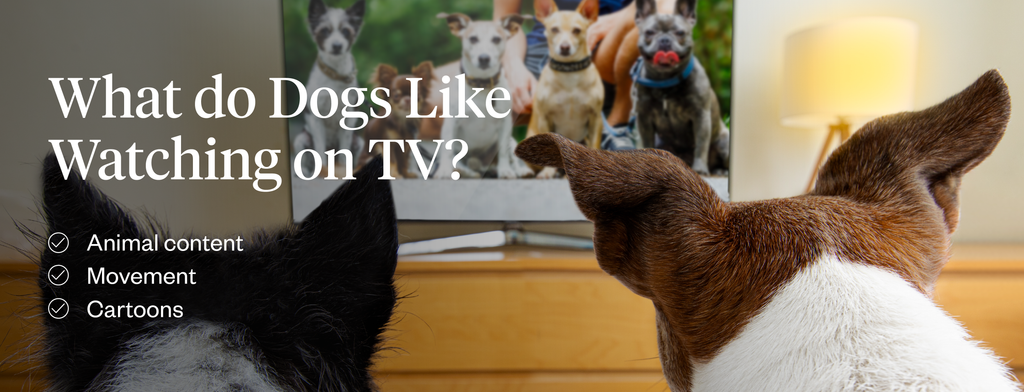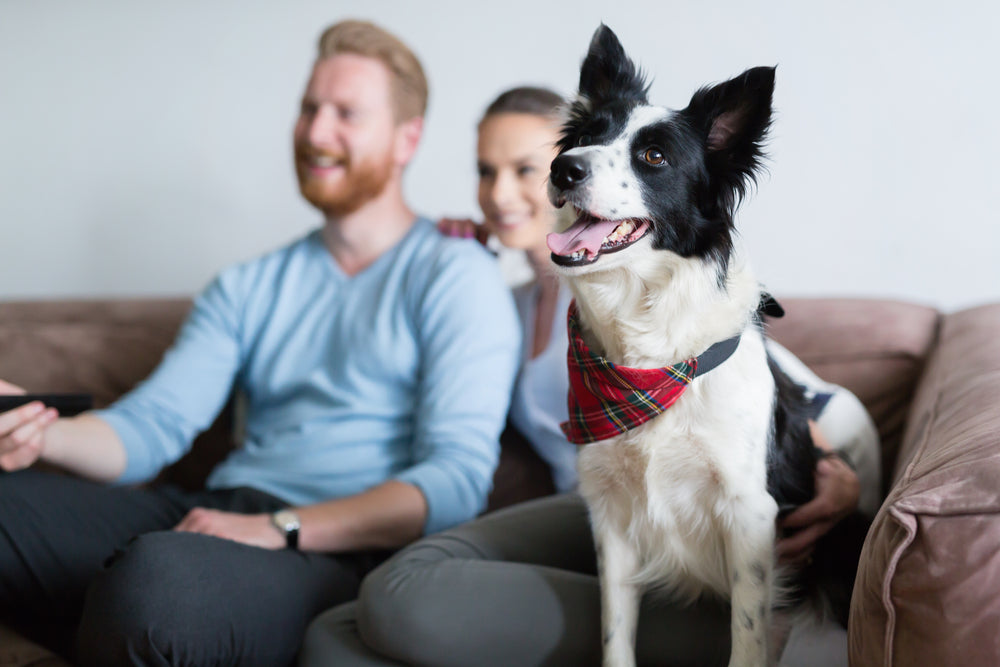10 Min Read
Do Dogs Like Watching TV?
Key takeaway

Why pet owners are switching to online vet care with Dutch
-
Prescriptions delivered free to you
-
Fast access to Licensed Vets over video
-
Unlimited video visits and follow-ups
Dogs can see TV, but whether they enjoy watching it is less clear. Many pet parents have wondered, "Do dogs like watching TV?" But we can't be sure that they derive the same enjoyment from it as humans do.
However, leaving the TV on can serve as a form of enrichment for dogs, potentially providing them with company and easing anxiety when their owners are away. Television can be used to drown out other noises that might startle a dog, like doors slamming, thunderstorms, and fireworks, or you might use it as an activity for them to enjoy when working from home with pets. Dogs can see images and hear sounds on the television, but "Do dogs like TV?" is another question altogether.
So, do dogs like to watch TV? Keep reading to find out.
Can Dogs See TV?
Believe it or not, dogs can perceive images on television similarly to the way humans do. These animals are intelligent enough to recognize onscreen images of animals, even those they've never seen before, and react to them.1
However, there are differences in how humans and dogs see television. Dogs' eyes register images more quickly than humans, so some televisions may appear to flicker to them.
Additionally, dogs aren't as color blind as you might think. They have dichromatic vision, seeing primarily yellow and blue, while humans have trichromatic vision, perceiving a full range of colors.1
Keep in mind that dogs' reactions to TV can vary based on personality and individual preferences. You might catch some dogs staring intently at the television while others don't care for it. Some dogs can also become excited or bark at animals on the screen, while others may be desensitized to it.1
Therefore, while dogs can see television, they likely don't enjoy it in the same way we do, and they're more likely to lose interest. That said, it can provide some stimulation and company for dogs, especially when left alone for periods of time.1

Potential Benefits & Risks
When considering leaving the TV on your dog, weighing the potential advantages and drawbacks is essential. While TV viewing can offer sensory stimulation and enrichment for some dogs, there are concerns regarding its impact on behavior and well-being.
Potential benefits of dogs watching TV include:
- Sensory and visual stimulation: Do dogs like to watch TV when alone? TV offers dogs essential sensory and visual stimulation, potentially alleviating feelings of boredom and anxiety when left alone.
- Enrichment: TV programming can serve as enrichment, exposing dogs to a variety of sights and sounds and contributing to their mental stimulation and overall well-being.
- Enjoyment: Some dogs may genuinely enjoy watching TV, especially when programs feature other dogs or emit soothing sounds. Do dogs like music? Some studies suggest that music can help reduce anxiety in dogs, but it shouldn't be relied upon as a treatment or cure.
- Tailored content: Platforms like DOGTV are designed with input from experts, ensuring that the content aligns with dogs' preferences and needs, maximizing its effectiveness as a source of entertainment and enrichment.
Potential risks of dogs watching TV include:
- Varied responses: Not all dogs may benefit from or enjoy watching TV, and some may become anxious or frustrated, particularly those reactive to other dogs on screen. If you have an anxious dog, they may benefit from a sanctuary space where they can relax in peace rather than having the television on.
- Replacement of essential activities: Excessive TV viewing should not replace essential activities like exercise, fresh air, and human companionship, which are vital for a dog's physical and mental health.
- Potential unnecessity: Leaving the TV on for long periods may not be necessary and could be more for your own comfort than your dog's benefit, potentially leading to unnecessary energy consumption and environmental impact.
- Unknown long-term effects: The impact of long-term TV exploration on dogs' behavior and well-being hasn't been fully studied, requiring pet parents to use caution and moderation in incorporating TV viewing into their dog's routine.2
- Learning via television isn't as beneficial as once thought: A recent study explored dogs' responses to video images. It found that while dogs could perform tasks instructed via video, their performance was less reliable than real-life interactions with owners.3
Whether dogs benefit from watching TV depends on individual preferences and needs, as well as the owner's intentions and lifestyle, highlighting the importance of personalized care and attention to each dog's well-being.

What do Dogs Like Watching on TV?
So, do dogs like watching TV? Ultimately, every dog is different. For instance, your dog might not be interested in watching TV at all, while other dogs may enjoy watching television when you do.
What TV shows do dogs like? Research conducted by the University of Wisconsin School of Veterinary Medicine yielded several interesting conclusions about what dogs prefer to watch on TV. Information was gathered by a global survey of over 1,600 dog owners that asked them to describe their dog's behavior when watching specific content. Here's what they found:4
- Preference for animal content: Dogs engaged most when watching videos featuring other animals. Content related to their own species was particularly appealing. This suggests that dogs are more interested in seeing familiar animals on screen.
- Limited interest in humans: Surprisingly, humans did not appear to be very appealing for dogs to watch, ranking 9th out of 17 predetermined categories. This indicates that dogs may not find human-centric content as engaging as animal-focused content.
- Preference for movement: Dogs strongly preferred videos with movement on screens. This suggests that motion is a significant motivator for capturing a dog's attention when watching TV.
- Variation by dog: Sporting and herding dog breeds appeared to watch all content more than other breeds. This indicates the possibility that different breeds have varying interest levels in TV content. Additionally, vision loss can affect whether a dog actively watches television.
- Engagement with cartoons: Interestingly, cartoons were engaging for more than 10% of the dogs. This suggests certain types of animated content may appeal to dogs, possibly due to the exaggerated movements and colorful visuals often found in cartoons.4
Overall, this study provides valuable insights into what types of TV content dogs find most engaging. That said, more research is needed to fully understand the intricacies of canine viewing preferences and how they may vary across dogs.
So, what do dogs like watching on TV? The study's findings suggest that dogs prefer animal-centric content, particularly featuring their own species, and are more attracted to videos with movement.
Keep in mind that there are many videos available online for dogs. The best of these videos and content from DogTV, the cable channel designed for dogs, appeal to dogs using HDTV with a higher number of frames per second and specially colored videos tailored to dogs' dichromatic vision. The channel offers various models, including relaxation, stimulation, and exploration, to cater to different dog preferences and needs.1
Keep in mind that a dog's reaction to TV may vary. While some dogs become excited and bark at animals on the screen, others may be indifferent to TV content altogether.
FAQs
Is it OK for dogs to watch TV?
Typically, no harm can come from dogs watching television. However, this is a topic of debate among experts in the field of animal behavior and veterinary medicine. Some argue that dogs can benefit from watching television, as it provides sensory and visual stimulation that helps prevent boredom and anxiety when left alone.
Certain programs designed specifically for dogs may also offer enrichment by exposing them to different sights and sounds, potentially enhancing their overall well-being.
However, other experts caution against excessive TV viewing for dogs, emphasizing that it should not replace essential activities like exercise, mental stimulation, and human companionship.
Whether a dog benefits from watching TV depends on individual preferences and needs. You can test it out by turning the television on for your dog and watching their behavior throughout the day.
Do dogs like having the TV on when they're alone?
Some dogs may benefit from having the TV on when they're alone, as it can prevent boredom and provide comfort in the form of background noise and visual stimulation. However, not all dogs may benefit from or enjoy having the TV on, and some may even find it stressful or overwhelming if they're sensitive to loud noises or sudden movements on the screen.
You should observe your dog's behavior and reactions to determine whether having the TV on is suitable for your individual pet.
Why is my dog obsessed with TV?
Some dogs seem to love television. This is because dogs can find television entertaining and intriguing due to the movement, sounds, and visual stimuli it provides. Certain programs or channels may feature content that appeals to dogs, such as images of other animals or nature scenes.
Additionally, dogs have a keen sense of hearing and can detect sounds emitted from the TV, which may capture their attention, especially if they hear barking or other familiar noises.
Dogs are also naturally curious creatures, and they may be attracted to the bright colors, fast-paced action, or stimuli presented on the screen. Watching TV can provide some level of enrichment or mental stimulation for them.

Final Notes
While dogs can see and sometimes enjoy watching TV, not all dogs may find it engaging. TV can provide sensory stimulation and enrichment for some dogs, potentially easing boredom and anxiety when left alone. However, you should monitor your dog's reactions and ensure that watching TV doesn't replace essential activities like exercise, mental stimulation, and human companionship.
Unfortunately, while watching TV may help some dogs feel less anxious when their pet parents are away, it's not a cure. If your dog suffers from anxiety, it should be addressed with proper care. Consider Dutch telemedicine for pets for a virtual consultation with a licensed vet to provide guidance and support for your pet's well-being. You can also explore our online pet pharmacy for convenient access to medications and supplements recommended by your veterinarian. Try Dutch today.
Share
References
-
Langley, Liz. "Why Do Dogs Watch-and React-to TV?" Animals, National Geographic, 3 May 2021, www.nationalgeographic.com/animals/article/150111-animals-dogs-television-pets-science-tv-behavior.
-
Free, Cathy. “Do Dogs like TV? Americans Are Finding out as We Try to Ease Their (And Our) Separation Anxiety.” 10 Dec. 2021, www.washingtonpost.com/lifestyle/2021/12/10/dogtv-pet-programming-channel-levi/.
-
"Can Dogs Learn by Watching Television?" Psychology Today, Sussex Publishers, www.psychologytoday.com/us/blog/canine-corner/201510/can-dogs-learn-watching-television.
-
"Knowing What Dogs Like to Watch Could Help Veterinarians Assess Their Vision." School of Veterinary Medicine, 17 Jan. 2024, www.vetmed.wisc.edu/knowing-what-dogs-like-to-watch-could-help-veterinarians-assess-their-vision/.



